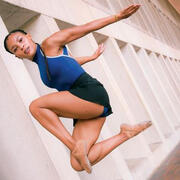
Nadia Milad Issa (they/them) is a scholar-practitioner, dance educator, and an Iyalochá (fully initiated high priestess of Regla de Ocha-Ifá). A lifelong dancer, Nadia graduated from Hampshire College with an individualized degree in dance, anthropology, and Africana studies. They’ve continued fusing art and activism in their work at HDS, where they focus on Afrikan-derived traditions in the Afro-Caribbean diaspora, particularly Afro-Cuban and Afro-Brazilian traditions of Regla de Ocha-Ifá, Candomblé, and Umbanda.
The only initiated Orisha practitioner at Harvard Divinity, Milad Issa is carving their own academic path, taking the space and care to share stories of their Egún (ancestors) and honor their traditional practices with faculty and peers. Milad Issa says they are guided by their Egún and orishas (deities of Regla de Ocha-Ifá) in all they do. “As an Afro- Domincanx and Lebanese scholar-practitioner, artist-academic, and Iyalochá, I need to bring all of myself to the table.”
This past year has imparted in Milad Issa a fierce sense of urgency, yet it has also brought about a deeper spiritual shift in their approach to activism. As a younger activist, Milad Issa tended toward the front lines of protests. Now, they’ve taken their sense of living and mobilizing for Black Liberation to the page—and the dance floor. Whether they’re writing autoethnographies, conducting fieldwork in Cuba, México, and soon Brazil, performing as a company dancer with a Haitian folklore and contemporary dance company, or presenting at academic conferences, Milad Issa sees their work as an act of embodied ritual and resistance grounded in spirit.
Their current academic and personal focus? Spiritual Reparations (a term they coined) for marginalized communities. “Yes, we can ask for money and for land and for education,” Milad Issa shares. “But what does that mean if Black people’s spirits are still broken in ways that can’t be compensated for monetarily?”
“In my tradition, everything is done in community—initiation, ritual practices, ceremonies. Without that community, there is no me.” Nadia Milad Issa
Milad Issa is particularly interested in Spiritual Reparations in the face of catastrophes, like the devastation of the environment as a multiverse of sacred spaces, and the religious racism targeting Afro-Brazilian and Afro-Cuban spiritual-religious traditions. As a fully initiated high priestess in the Yoruba tradition that manifested in Cuba, Milad Issa is invested in protecting and preserving the generational embodied knowledge of their ancestors and other spiritual and ritual kinship networks. The Yoruba spiritual-religious practice is a nature-based tradition, and it permeates every aspect of their life: “My practice is not just a Sunday at church—it’s every day. It’s how I wake up, it’s how I walk down the stairs, it’s how I talk to people, how I respect my elders.”
As they finish their MTS, Milad Issa plans to continue developing their own unique blend of art and activism, honoring the traditions of their ancestors, while co-creating spaces of spiritual healing and world-changing liberation with their HDS peers. “My cohort is truly incredible,” they reflect. “I’m continually blown away by the radical, transformative work they’re doing.”
Learn more about “Dancing Deities in the Diaspora.”
—by Sarah Fleming